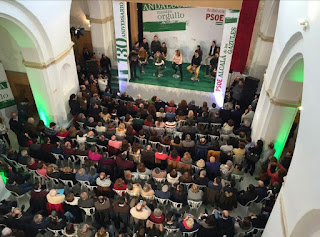A bit of political history: The "Alcalá Clan"

This is a translation of an article by Pedro Ingelmo in Diario de Cadiz, 10 April 2011. It was written after the sudden resignation of Luis Pizarro from his senior position in the Junta de Andalucía, following differences of opinion with then President José Antonio Griñan. Pizarro is the father of Alcalá's current mayor, Javier Pizarro, and brother of Paco, owner of the Restaurante Pizarro. The Electrician’s Seed: How the “Alcalá Clan” was Born The history of the PSOE in Cadiz is linked to a small town in the gateway to the Alcornocales, Alcalá de los Gazules, out of which emerged a group which had a decisive influence on the politics of Andalucía for decades. It is not possible to explain the symbolic significance of the sudden departure of Luis Pizarro from Griñan’s government without a trip into the past. For many, Pizarro is the end of the line, a perpetual link with the origins of Andalusian socialism. Luis Pizarro was, and is, the patria...




